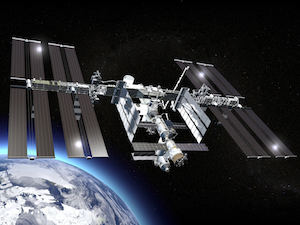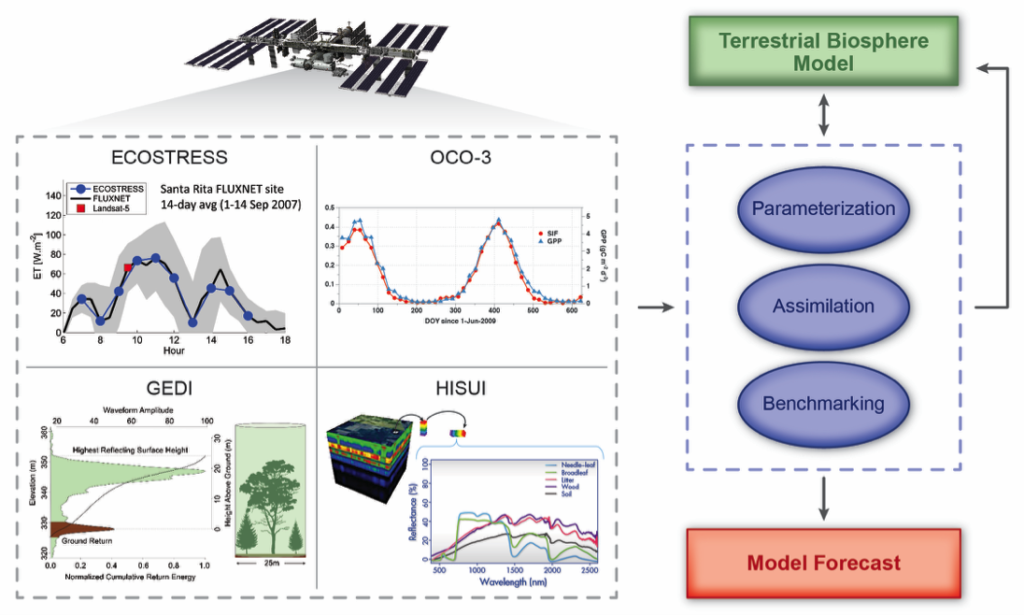
New instrumentation will be installed on the International Space Station that will provide a unique opportunity to gain important insights into poorly understood ecosystems
The Science
Ecosystems, particularly tropical forests, play an important role in determining the rate and extent of climate change by absorbing and storing about one-third of the carbon dioxide released when we use oil, coal and other fossil fuels. Our current understanding of how ecosystems take up and store carbon dioxide is limited to those areas that can be reached by the scientists that study them. However, these study sites only represent a small fraction of the total land area that we need to study in order to understand how much and for how long plants will continue to help slow the rise of atmospheric carbon dioxide concentration. New instrumentation and technology offers the opportunity to remotely measure many important properties of plants and ecosystems that will determine how the planet will respond to a changing climate and provide critical data for scientists to test models of how ecosystems will respond to a changing climate. Specifically, remote measurement of tree height, temperature, carbon dioxide take up and biochemical composition offers exciting new opportunities for science. This work highlights the deployment of this new instrumentation on the international space station (ISS), informs the scientific community of the opportunity presented by these measurements and describes ways to use this unique data. The work is the result of detailed discussions and an ongoing collaboration between ecosystem modelers, experimentalists, and remote sensing scientists.

The Impact
This comment provides a clear vision on the ways in which the experimental, modeling, and remote sensing communities can use simultaneous observations of ecosystem structure, function, composition, and biochemistry from a suite of novel sensors that will be installed on the International Space Station (ISS). Importantly, the collection of these remotely sensed data will improve our understanding of ecosystems as well as our ability to test predictive models.
Summary
In order to improve prediction of the ability of plants to slow the rate of climate change by absorbing and storing carbon dioxide our science desperately needs more data about the composition, function, and structure of terrestrial ecosystems, particularly in remote regions such as the tropics. Unfortunately, our current ability to measure and understand important ecosystem processes is too sparse, and too spatially biased to make significant progress. Satellite observations are the only source for the dense, frequent, spatially and temporally extensive records required. The unique collection of new measurements anticipated from the ISS will yield important new insights into ecosystem structure and function and provide important new observations to evaluate the models we use to understand how important ecosystems, such as tropical forests, will respond to a changing climate.
Contacts (BER PM): Daniel Stover, SC-23.1, Daniel.Stover@science.doe.gov (301-903-0289)
PI Contact
Lead PI: Natasha Stavros, NASA JPL, Natasha.Stavros@jpl.nasa.gov
BER funded PI: Shawn Serbin, Brookhaven National Laboratory, sserbin@bnl.gov
Funding
S.P. Serbin was supported by the Next-Generation Ecosystem Experiment (NGEE-Tropics) project. The NGEE-Tropics project is supported by the Office of Biological and Environmental Research in the Department of Energy, Office of Science. The Exploring New Multi-Instrument Approaches to Observing Terrestrial Ecosystems and the Carbon Cycle from Space workshop and participant travel costs were supported by the W. M. Keck foundation.
Publications
Stavros, NE, Schimel, D, Pavlick, R, Serbin, SP, Swann, A, Duncanson, L, Fisher, JB, Fassnacht, F, Ustin, S, Dubayah, R, Schweiger, A, Wennberg, P, “ISS observations offer insights into plant function.” Nature Ecology and Evolution, (1), 01974. DOI: 10.1038/s41559-017-0194
Related Links
Keck workshop link:
http://kiss.caltech.edu/new_website/workshops/ecosystem/ecosystem.html
Serbin (DOE-TES) workshop talk & video link:
-Talk: http://kiss.caltech.edu/study/ecosystem/Presentations/SSerbin_KISS_Workshop_final.pdf
-Video: https://www.youtube.com/watch?v=DmdsLM0Fl_Q